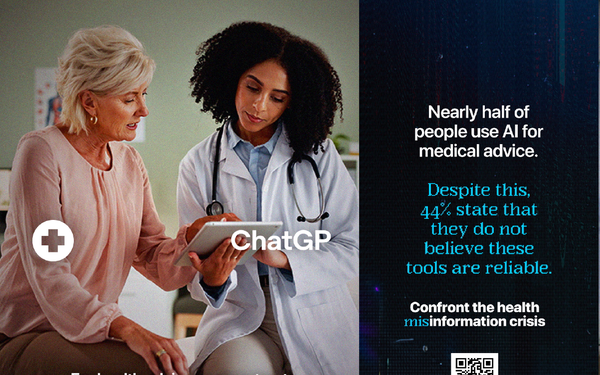Listen to the article
Pharma Industry Called to Combat Rising Health Misinformation
Healthcare communications leader Havas Lynx has issued a stark warning about the proliferation of health misinformation online, urging pharmaceutical companies to take decisive action in a comprehensive new report titled “Doctored Truths.”
The 72-page white paper reveals alarming statistics: nearly one-third of social media posts related to health contain misleading or false information, and a third of patients later regret decisions made based on such unreliable sources. These findings highlight a growing crisis that threatens both individual patient outcomes and the broader practice of evidence-based medicine.
“The spread of health misinformation is a profound threat to patient well-being and the very foundation of evidence-based medicine,” said Claire Knapp, CEO of Havas Lynx, in a statement accompanying the report. However, Knapp emphasized that pharmaceutical companies are uniquely positioned to address this challenge, noting they “could hold the antidote” thanks to their “deep clinical expertise and access to credible data.”
The call for pharmaceutical intervention appears to align with broader healthcare sentiment. According to the report, 71% of healthcare professionals believe the industry has a responsibility to combat health misinformation, yet only 41% feel pharmaceutical companies are currently doing enough to address the problem.
Havas Lynx outlines a three-pronged strategy—dubbed “the three Cs”—for pharmaceutical companies to counter the spread of misinformation: “Counsel” the public by teaching critical thinking skills; “Curb” the spread of false information; and “Correct” inaccurate health claims with factual information.
The report highlights Unilever’s “Vaseline Verified” as a successful case study in tackling product misinformation. Faced with over 3.5 million online “hacks” involving its product, Unilever launched the #VaselineVerified campaign through WPP’s Ogilvy Singapore. The initiative involved Unilever’s R&D team methodically testing hundreds of these user-generated hacks to identify which were genuinely effective. The campaign earned significant industry recognition, winning nine Cannes Lions awards.
To address the growing sophistication of health misinformation, particularly content generated or amplified by artificial intelligence, “Doctored Truths” recommends that pharmaceutical companies develop AI-powered tools capable of identifying and debunking misleading health content. The report specifically mentions tech vendor Cyabara, which offers “AI shields” designed to detect fake profiles, harmful narratives, AI-generated content, and deepfakes.
Havas Lynx recently demonstrated its commitment to this cause with a tactical outdoor advertising campaign in Manchester, England. The one-day initiative contrasted ads for ChatGPT with the agency’s own “ChatGP” billboards placed in high-visibility locations throughout the city. The billboards, featuring images of patients with their doctors, carried the message: “For health advice you can trust, chat with your GP.” Mobile billboards on bicycles circulated throughout the city to capture additional content and public reactions, which were subsequently shared online.
The agency notes that this activation directly addressed a key finding from their research: while nearly half of people now consult AI for medical advice, 44% express doubts about its reliability.
As health misinformation continues to proliferate across digital channels, the pharmaceutical industry faces mounting pressure to leverage its expertise and resources to protect public health. Havas Lynx’s report suggests that beyond ethical responsibility, there may be strategic advantages for pharmaceutical companies that take leadership positions in this increasingly important battle for accurate health information.
Fact Checker
Verify the accuracy of this article using The Disinformation Commission analysis and real-time sources.




14 Comments
The report’s findings underline the urgency for pharma to step up and combat the growing challenge of online health misinformation. Patients deserve access to reliable, science-backed information.
Pharmaceutical companies should leverage their resources and expertise to develop innovative digital tools and strategies to reach and educate the public.
This is an important wake-up call for the pharma sector. With so much misinformation circulating, they have a responsibility to step up and lead the fight against the spread of false health claims.
Leveraging their clinical data and scientific know-how, pharma companies can be a powerful voice for truth in the digital health landscape.
The statistics around the prevalence of health misinformation on social media are truly alarming. Pharma must take this threat seriously and develop robust strategies to address it.
Collaboration with healthcare authorities and digital platforms could help establish clear guidelines and policies to limit the spread of false medical claims online.
Interesting that the report highlights how a third of patients regret decisions made based on unreliable online sources. Pharma has a major opportunity to restore trust and credibility.
Proactive digital campaigns and partnerships could go a long way in countering misinformation and empowering patients with accurate, science-based information.
Combating health misinformation is a critical priority for the pharmaceutical industry. They have the data and expertise to provide credible, evidence-based information to counter the alarming spread of misleading claims online.
Pharmaceutical companies need to be proactive in shaping the online narrative and helping patients make informed decisions about their health.
Given their deep understanding of clinical data and evidence-based practices, pharmaceutical companies are uniquely positioned to provide a powerful counterweight to health misinformation.
Proactive public education campaigns and transparent data-sharing could go a long way in empowering patients to make informed decisions about their health.
This is a critical call to action for the pharmaceutical industry. With patients increasingly relying on unverified online sources, pharma must assert its role as a trusted voice on health-related matters.
Collaboration with healthcare authorities, digital platforms, and patient advocacy groups could amplify pharma’s efforts to counter the spread of medical misinformation.